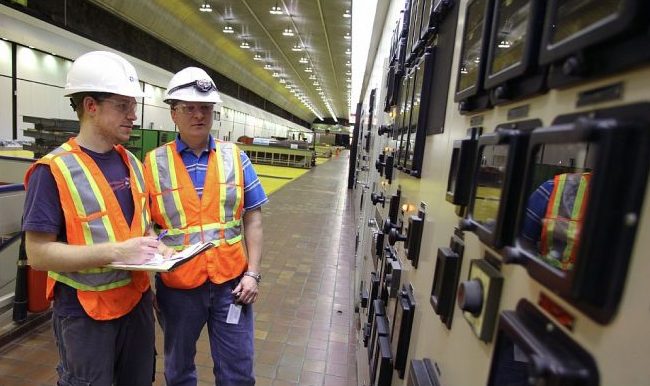
Supreme Court to hear bid to reopen lopsided Churchill Falls hydro deal
by Sue Bailey, The Canadian Press

The 1969 deal has soured relations between Quebec and Newfoundland and Labrador for decades

The powerhouse at the Churchill Falls hydro plant, the long-time source of controversy between the two provinces. PHOTO: Nalcor Energy
ST. JOHN’S, N.L.—The Supreme Court of Canada will be asked Dec. 5 to reopen a notoriously lopsided 1969 deal that has so far generated more than $27.5 billion for Hydro-Quebec, versus about $2 billion for Newfoundland and Labrador.
Lawyer Doug Mitchell will argue the contract for the Churchill Falls hydro station in Labrador should be renegotiated to reflect vastly changed circumstances. He says negotiators almost 50 years ago could not have foreseen how energy markets would completely shift, allowing Hydro-Quebec to buy that power at cheap fixed prices then sell it for huge profits.
The resulting disparity has fuelled a bitter feud between the two provinces.
“It’s a landmark contract in Canadian legal history,” Mitchell said in an interview. “It’s also an important point in law that many jurisdictions are wrestling with: What do you do if there are unforeseen circumstances that change the equilibrium of the contract? Does the law do nothing or does the law do something?
“It’s a topical issue in Quebec law and Canadian law more broadly—and, frankly, around the world.”
At issue is whether partners in long-term deals are obligated by so-called good faith principles to adjust terms over time.
Hydro-Quebec says it helped finance Churchill Falls in exchange for price guarantees that don’t expire until 2041.
This latest bid to reopen the contract “presupposes the existence of a judicial power to review and amend contracts in the event of changed circumstances,” says Hydro-Quebec’s submission to the high court.
“This right does not exist under Quebec civil law irrespective of whether one uses the term … good faith, duty to co-operate or abuse of right to describe it.”
Under the 1969 terms, Hydro-Quebec agreed to buy almost all the energy from the Churchill Falls plant. The deal set a fixed price for that power that would decrease in stages over time.
Various aspects of the contract have already been argued before the top court on different legal principles, twice, without success.
This most recent challenge started when Churchill Falls (Labrador) Corp. Ltd.—whose parent company is Crown corporation Nalcor Energy—went to Quebec Superior Court in 2010. It argued that profits of such magnitude from electricity were unforeseen in 1969 and that Hydro-Quebec had a duty to renegotiate terms. It lost.
The Quebec Court of Appeal upheld the 2014 lower court decision, agreeing the provincially owned power utility has no obligation to reopen the agreement.
“It is inappropriate to re-examine the parties’ circumstances when they signed the contract,” ruled the five appeal court judges. “The uncontradicted evidence establishes that they knew that the price of hydroelectric power was subject to fluctuation but they voluntarily agreed to fix the price.”
The decision also said the general principle of “good faith,” as found in Quebec’s civil code, doesn’t apply to Churchill Falls as the contract has remained “profitable” for Newfoundland.
Mitchell argues the appeal court “applied a flawed standard of foreseeability that renders the concept essentially meaningless.”
A decision from the Supreme Court is not expected for several months.
Natural Resources Minister Siobhan Coady says a win could mean billions of dollars as Newfoundland and Labrador faces deficits and mounting debt. The oil price crash starting in 2014 was a major blow to provincial finances.
“It’s very important,” Coady said. “There could be some remedies by the Supreme Court that will make a difference to this province.”